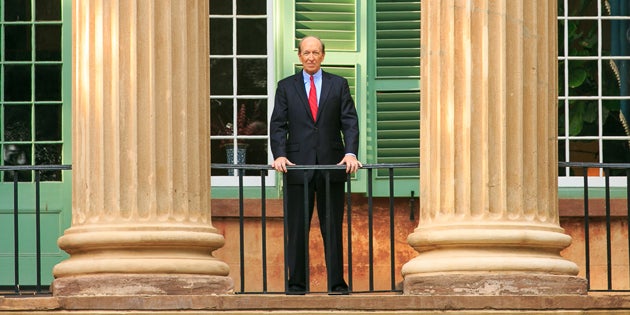President George Benson will officially conclude his seven-year tenure as president of the College of Charleston on June 30, 2014. He plans to take a one-year sabbatical before returning to the College to teach in the School of Business.
In a recent retrospective of Benson’s presidency in College of Charleston Magazine, the outgoing president reflected on what he’ll miss most about the job as well as what he sees as opportunities and challenges for the College in the years ahead.
Q: What will you miss most about being President?
A: I’ll miss the people that I work with and the day-to-day excitement of the job. I’m so honored to lead an institution that’s as important as the College of Charleston. Leading a diverse, complex, sophisticated organization like the College is fun, and I’ll miss it.
Q: What is your favorite location on campus and why?
A: I have a great view of Cistern Yard from my office in Randolph Hall. But in terms of interacting with students, faculty, and staff I enjoy the patio of Addlestone Library overlooking Rivers Green. I like to sit there sometimes in the afternoon to chat with people.
Q: What alumni achievement has most impressed you?
A: Arlinda Locklear, class of 1973, becoming the first Native American woman to argue a case before the United States Supreme Court.
RELATED: Read a profile of Arlinda Locklear ’73 in College of Charleston Magazine.
Q: Where would you like to see the College in 20 years?
A:  We are now moving toward becoming what we are calling an emerging research university. My hope is that in 20 years the College will be part of a large comprehensive research university in Charleston called Charleston University, which will include the College, MUSC, and the Charleston School of Law. I would like to see that happen for Charleston and the Lowcountry. A comprehensive research university will enhance the quality of life in the area and creating jobs and economic development opportunities. This region needs and deserves its own research university.
We are now moving toward becoming what we are calling an emerging research university. My hope is that in 20 years the College will be part of a large comprehensive research university in Charleston called Charleston University, which will include the College, MUSC, and the Charleston School of Law. I would like to see that happen for Charleston and the Lowcountry. A comprehensive research university will enhance the quality of life in the area and creating jobs and economic development opportunities. This region needs and deserves its own research university.
Q: What are the biggest challenges facing the College, and how do we overcome them?
A: Challenges aren’t always things to overcome, challenges are opportunities. There are many people who think the College should stay as it was in the 1970s. That’s not possible or appropriate. Education has changed so much since then along with the responsibilities to our students. We are significantly larger than we were then and our responsibilities to the city, Lowcountry, and the state are much greater. Therefore, one of the challenges is helping people to understand that the College needs to move ahead quickly or be left behind and be marginalized as other universities move ahead of us.
Q: Why has Dixie Plantation been so important to you?
A: Dixie is important because of the opportunity that it represents for our students and our faculty. We are turning it into a sustainability and environmental sciences campus that will be used by students from any and all disciplines.
It will give us an historic downtown campus and a sister campus, just 17 miles away on the Intercostal waterway –– the Stono River. We’ll have the best of two different worlds –– the best of a natural environment and the best of an urban environment for our campus.
Q: What was your most memorable moment as President?
A: Beating UNC, the defending NCAA champions in men’s basketball, in TD Arena on January 4, 2010. I also love spring commencement in Cistern Yard. It is one of the most beautiful and unique commencement ceremonies in the country. I thoroughly enjoy how we dance out to rock ‘n’ roll music during the recessional.
RELATED: Watch highlights from the Cougars’ 2010 upset of UNC.
Q: If money were no object, what new building or facility for the College would top your wish list?
A: Three buildings:
- A learning center that would be built on the parking lot of Addlestone Library. This is already called for in our Campus Master Plan. The building will be setup for distance education and for classes to work in teams. It will be a facility devoted to the knowledge economy as symbolized by the Internet and new media and all the educational opportunities that they represent.
- A conference center at Dixie Planation.
- A residence hall at Dixie Plantation.






